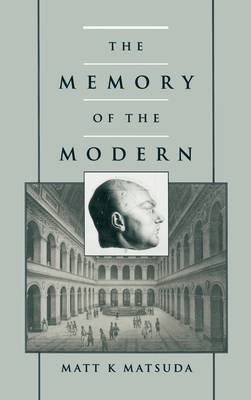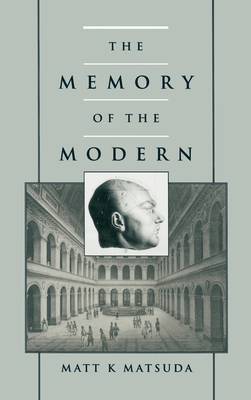
- Afhalen na 1 uur in een winkel met voorraad
- Gratis thuislevering in België vanaf € 30
- Ruim aanbod met 7 miljoen producten
- Afhalen na 1 uur in een winkel met voorraad
- Gratis thuislevering in België vanaf € 30
- Ruim aanbod met 7 miljoen producten
Zoeken
Omschrijving
Memory has a history. The Classical world ordered and valued events differently than the Medieval world; which, in turn, was replaced by "the memory" of the Renaissance. Matt Matsuda's compelling, multidisciplinary argument in The Memory of the Modern is that the understanding, value, and uses of memory changed yet again at the end of the nineteenth and the beginning of the twentieth centuries, becoming distinctively "modern." Matsuda proves his argument by visiting a remarkable array of "memory-sites" the destruction of a monument to Napoleon during the 1871 Paris Commune; the frantic selling of futures of the Paris stock-exchange; the state's forensic search for a vagabond rapist and murderer; a child's perjured testimony on the witness stand; a scientist's dissecting of the human brain; the invention of cameras and the cinema. Each chapter studies a distinct moment when new representations of the past were forged, contested, and put to cultural and ideological use. And all these diverse events cohere as Matsuda repeatedly shows which "memories" were celebrated and which forgotten, which traditions invented and appropriated and which discarded. More importantly, he explains why, and in doing so answers the broader question: Who controls what is remembered and who is believed? Matsuda demonstrates that the questions raised by the history of the birth of modern memory at the turn of the century resonate in the critical, ethical, and historical challenges of our own modernity and post-modernity.
Specificaties
Betrokkenen
- Auteur(s):
- Uitgeverij:
Inhoud
- Aantal bladzijden:
- 264
- Taal:
- Engels
Eigenschappen
- Productcode (EAN):
- 9780195093643
- Verschijningsdatum:
- 2/05/1996
- Uitvoering:
- Hardcover
- Formaat:
- Genaaid
- Afmetingen:
- 161 mm x 237 mm
- Gewicht:
- 594 g

Alleen bij Standaard Boekhandel
+ 814 punten op je klantenkaart van Standaard Boekhandel
Beoordelingen
We publiceren alleen reviews die voldoen aan de voorwaarden voor reviews. Bekijk onze voorwaarden voor reviews.











